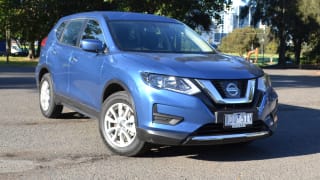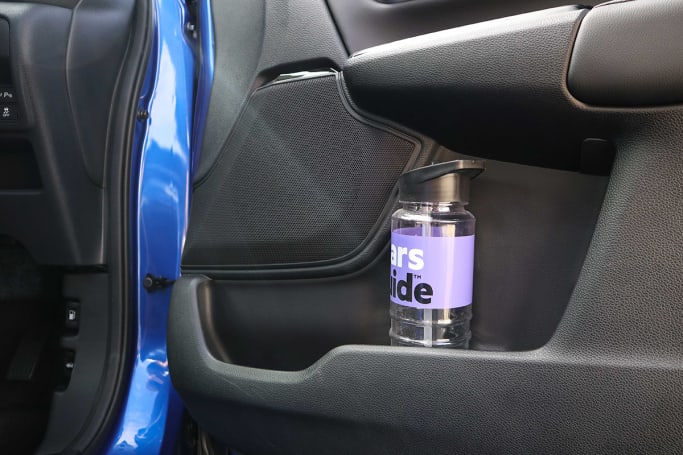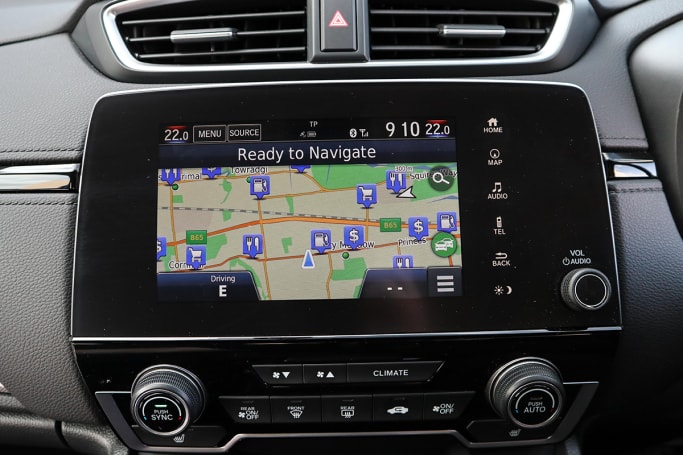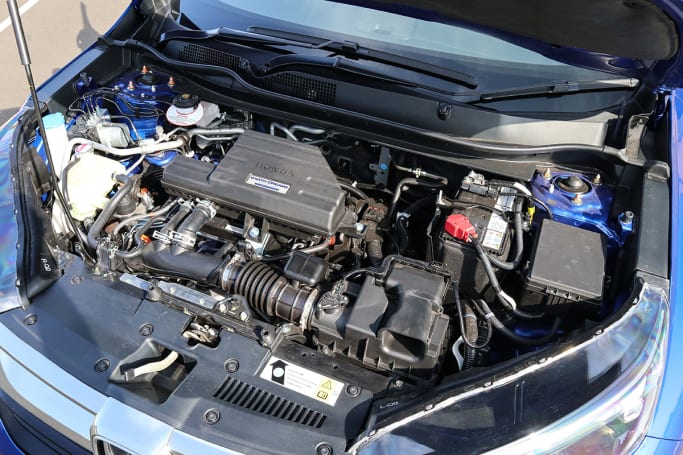
Nissan X-Trail ST 2WD 7 seat 2017 review
The latest version of the X-Trail came out in May 2017 and it doesn't just look different, it is, with more advanced safety equipment, just for starters. Could this XT be the X-Trail for you?
Browse over 9,000 car reviews
Honda’s once-ground breaking medium sized SUV enters its fifth generation, and will be a pivotal car for the venerable but vulnerable carmaker that’s slowly but surely lagging behind its key Japanese and Korean rivals - and the Chinese are coming, as well.
The fifth generation CR-V has come along way since its humble origins back in 1997. It does, however, have to line-up against a vastly wider arrange of contenders in an incredibly competitive space that not only includes its old arch rival, the Toyota RAV4, but category leaders like Mazda's CX-5, and new players like the Peugeot 5008 and the Haval H7.
Amidst its line-up of five-seaters is the sole seven-seat offering, known as the VTi-L, which sits just one place shy of the top spot in the CR-V pecking order. Does the updated CR-V in seven-seat mode tick all the boxes? Let's find out.
| Honda CR-V 2017: VTI-L7 (2WD) | |
|---|---|
| Safety rating | |
| Engine Type | 1.5L turbo |
| Fuel Type | Regular Unleaded Petrol |
| Fuel Efficiency | 7.3L/100km |
| Seating | 7 seats |
| Price from | $30,030 |
Longer in the wheelbase and less Roger Ramjet in its extremity styling than the fourth generation, the chunky, bold CR-V offers a strong visual presence on the road.
The seven-seater carries over all of the external measurements from the five-seat line, too.

It’s a similar story on the inside, with strong, neatly resolved lines flowing across the dash and throughout the car. Honda has been guilty of overdoing things on recent generations of its most popular cars, but we’re glad to report the tide of overdesign is finally retreating.

The VTi-L is the only seven-seater in the CR-V range. It's not built on an extended wheelbase when compared to the five seat versions of the CR-V, which offer a great deal of room in the second row.
On first glance, the accommodations for the third row of seats in the VTi-L look cramped. A simple pull-strap activates the seat back to fold them into position, and occupants need to clamber over a folded down second-row seat to gain access.
Once back there, the two occupants have a fold down cupholder each and roof vents for comfort. But as you can imagine, luggage room drops to virtually zero when those seats are in place.
The one element that saves the VTi-L's seven-seat dignity is the ability to slide the second row of seats forward and back on their runners. They're split in a 60/40 fashion, and the backs can be inclined or reclined as necessary as well.
If all of your passengers in the car are tall, then you will be faced with compromise in terms of knee and legroom in both the second and third rows. But if your occupant mix varies in height and size, then it's possible to find a suitable arrangement where pretty much everyone is comfortable.
You'll need to put your smallest kid behind your tallest front seat occupant, and you may need to offset the second row in order to be comfortable in that third row. But despite the apparent lack of length in the CR-V, the seven-seat function does work.
However, there is compromise when it comes to luggage space. All seats can be folded flat, and there's an extra deck that can be moved into different slots to create the semblance of a flat floor. However, there are gaps all the way through between each seat row, and that floor level is quite high, which can make loading objects a little bit tricky, and it does steal away from cargo space.
The seven-seater loses about 50 litres of luggage space to its five-seat brethren when the third row is folded flat (472 litres to 522 litres), and 117 litres when all seats are down (967 litres to 1084 litres).
There is a full-sized spare under the boot floor, which needs some fiddling about to access. Kudos, though, for having something that's not a space saver or a can of goop.

Second-row seaters enjoy a pair of USB ports, cupholders in a fold-down centre armrest, as well as cupholders in the door. There is also a pair of ISOFIX baby seat mounts on the outside seats.
The biggest black mark against the second row of seats is the standard fitment of a full-length sunroof to the VTi-L. The different headlining that's required to fit the sunroof steals away a staggering 84mm of vertical head room for second row passengers (912mm), when compared to a base CR-V five-seater (996mm).
Combined with a bench that already sits quite high, even moderately tall passengers will find themselves hitting the roof, finding it positively uncomfortable even on a short journey. Our 15-year-old passenger is tall for his age, and found it uncomfortable to sit in the CR-V's rear for any length of time.
Front seat passengers are well catered for, though (despite losing 20mm of headroom thanks to that sunroof), with large divided door pockets that can stow bottles. A unique sliding tray covers a large, L-shaped box, and you can actually slide the cover back, Star Trek door style, to reveal a deeper space for wallets and phones.
There's a small tray underneath the gear shift which is ostensibly for phones, but most modern phones have outsized this small space. One oversight is that none of the trays have a removable rubber backing. Quite often cars have a small mat on the bottom of the storage containers that can be removed to wash.
Only the driver side seat is powered, while the passenger seat is manual in operation.
The gear shift is essentially mounted in the centre console itself, which does create more space through the middle of the two front seats, and the seats themselves are upholstered in a leather-like material, and are well bolstered and comfortable. Only the driver side seat is powered, while the passenger seat is manual in operation.
When it comes to other practicalities, like the multimedia system, unfortunately Honda has dropped the ball. While the 8.0-inch touchscreen looks good with sharp graphics, its functionality is simply not as good as many other, if not any other, device on the market.
Its key buttons are too small, and take too long to activate, and it's incredibly difficult to do simple things like find a source for multimedia. It's just not intuitive, and makes for a frustrating user experience.
The buttons on the steering wheel do help make it easier to use, while the dash dials have been replaced with a small digital screen, which is incredibly easy to use. It’s customisable in its look, and features a digital speedo as its central facet, which is very convenient.
The Honda also offers a range of locking aids that are linked back to its keyless entry system that include an instant lock when you walk away from the car, the ability to roll down the windows by depressing the unlock button as you approach the car - which is a great feature - as well as a powered tailgate.
Now, all these features are ultra convenient, but they definitely depend on user preference. Fortunately, it's easy to set up the car through the multimedia system to your liking.
There is a range of seven-seat options in the market around this price point, including Nissan's X-Trail. For for its $38,990 ask, the CR-V VTi-L comes pretty well equipped with automatic lights and wipers, 8.0-inch capacitive touchscreen multimedia system with Bluetooth, Apple CarPlay and Android Auto, heated front seats, power driver's seat and semi-leather upholstery throughout.

A powered tailgate, LED DRLs and regular halogen lights, a fairly comprehensive stereo system, as well as keyless entry and push button start, plus an electronic handbrake, are also included. It rides on 18-inch alloys, and has roof rails as standard, as well.
It does miss out, though, on new-generation driver aids like AEB and adaptive cruise control.
The entire CR-V range uses the same 140kW/240Nm 1.5-litre four-cylinder engine that’s found in the Civic. The VTi-L is a front-wheel-driver, and offers the ever more popular CVT auto as its only option.

Against a claimed combined cycle fuel economy figure of 7.3 litres per 100km, we achieved 8.6L/100km over 440km of mixed terrain testing in the VTi-L.
It’ll take 91RON standard unleaded without fuss, and its 57-litre tank is good for a theoretical range of 780km.
Equipped with a small capacity 1.5-litre four-cylinder turbocharged engine and a CVT auto, the CR-V is capable, if not outstanding, around town and on the open road. The engine only has 240Nm – not much for a turbocharged engine – and has to push around 1642kg.
CVTs continue to improve, in that the annoying droning effect of earlier versions has pretty much been eliminated, especially around town. But when pushed, the combination of the small four-cylinder engine slurring its gear changes isn't exactly pleasant.
The Honda rides well, with good roll control, decent if not overwhelming steering feel, and progressive braking under light foot conditions around the city. The front end, though, can wander a bit if you are not paying attention to your steering inputs.
It's quite direct from centre, which can mean keeping an eye on the helm, especially on longer trips. But, overall, the CR-V's ride comfort and handling prowess is on par with the best in the category.
The engine responds well to light throttle application to keep up with the flow of traffic, but it does need a prod to get up to freeway speeds. But once there, it holds speed easily.
One of the CR-V’s big bugbears, though, is noise. There's a lot of road roar noise coming from underneath the car, and there's also a fair bit of wind rustle coming through across the windscreen and the large exterior mirrors. Add to that a rumble from the stock tyre set, and it's a surprisingly noisy car, even in light of competitors in the space.
Basic Warranty
5 years / unlimited km warranty
ANCAP Safety Rating

The CR-V has a maximum five-star score from ANCAP, and offers full-length curtain airbags to all three rows, as well as parking sensors front and rear.
Unfortunately, Honda has not been able to fit the majority of its CR-V line-up with basic safety aids like AEB, blind spot monitoring, and lane departure, which it bundles together in a system called 'Honda Sensing'.
The VTi-L does feature a useful aid; the rear view camera lights up when you indicate to the left.
But the VTi-L does feature a useful aid; the rear view camera lights up when you indicate to the left, and lines on the multimedia screen indicate how far the car over your left shoulder is behind you.
It might able you to spot a car in the left blind spot that you may have missed, but oddly, it doesn't happen when you indicate to the right. What’s the point of having one side shown and not the other?
With a five-year, unlimited kilometre warranty, a reasonable 12 month/10,000km service interval and the first ten services capped at $295 (each), the CR-V won’t cost you an arm and a leg to run.
Without the safety aids offered on the top model, the VTi-L does become more expensive when compared to its competitors, and we encourage Honda to implement at least AEB across its range as soon as it possibly can.
The VTi-L is a decent, handsome, mid-sized family SUV for a smaller family, if they really need seven seats. If you don't need that third row, though, we'd recommend you have a look at the five-seat versions of the CR-V, as you'll find a lot more space and practicality on-board.
| Vehicle | Specs | Price* | |
|---|---|---|---|
| VTi (4x2) | 2.0L, ULP, 5 SP AUTO | $22,440 – 27,720 | 2017 Honda CR-V 2017 VTi (4x2) Pricing and Specs |
| VTi (4x4) | 2.4L, ULP, 5 SP AUTO | $22,880 – 28,270 | 2017 Honda CR-V 2017 VTi (4x4) Pricing and Specs |
| LE (4X2) | 2.0L, ULP, 5 SP AUTO | $21,560 – 27,280 | 2017 Honda CR-V 2017 LE (4X2) Pricing and Specs |
| LE (4X4) | 2.4L, ULP, 5 SP AUTO | $20,790 – 26,290 | 2017 Honda CR-V 2017 LE (4X4) Pricing and Specs |
| Design | 7 |
|---|---|
| Practicality | 5 |
| Price and features | 7 |
| Under the bonnet | 7 |
| Efficiency | 8 |
| Driving | 7 |
| Safety | 6 |
| Ownership | 8 |
$15,980
Lowest price, based on 128 car listings in the last 6 months